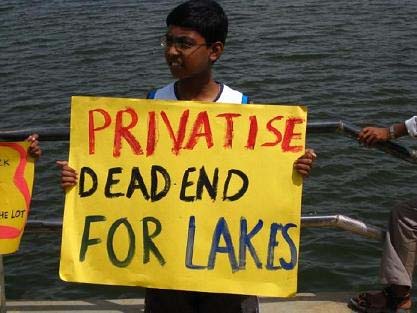/topics/contamination-pollution-and-quality
Contamination, Pollution and Quality
Encephalitis deaths in India - The same story of poverty, neglect, disaster and disease, how long will this continue ?
Posted on 02 Dec, 2011 10:15 AMGuest post by : Aarti Kelkar-Khambete
Water quality hot-spots in rivers of India: Comments by South Asia Network on Dams, Rivers & People, New Delhi
Posted on 30 Nov, 2011 04:54 PMThe Central Water Commission (CWC) has recently prepared a report on water quality scenario of our rivers and has evolved a methodology for identifying hot spots in Indian rivers. The water quality data is based on the average values observed during the last ten years (2001-2011) at 371 monitoring stations of CWC on almost all major, medium and minor rivers in India. Please find below a letter (dated November 5, 2011) from South Asia Network on Dams, Rivers & People, New Delhi to the Chairman, Central Water Commission stating its concerns regarding the report.
Status of groundwater quality in India - Report of the survey conducted in metropolitan areas by the CPCB
Posted on 24 Nov, 2011 05:36 PMThe report recognises that most groundwater quality problems are anthropogenic in origin, caused by a combination of over-exploitation and infiltration of wastes. Inadequate infrastructure and resources mean that waste generated by cities and industrial areas is not properly collected, treated and disposed, thus leading to grondwater contamination.
Guidelines for water quality management and monitoring by Central Pollution Control Board (2008)
Posted on 23 Nov, 2011 05:14 PMThe documents titled 'Guidelines for water quality management' and 'Guidelines for water quality monitoring' are published by the Central Pollution Control Board (CPCB) in 2008, under the guidance of the Water Quality Assessment Authority formed under the Ministry of Environment and Forests (MoEF).

Karnataka High Court Committee strongly discourages commercial involvement in lake management and rejuvenation
Posted on 23 Nov, 2011 03:57 PMContent and photo courtesy: Environment Support Group
On the contentious policy relating to privatization of lakes, the Justice N K Patil Committee appointed by the Karnataka High Court has recommended that private sector participation solely based on commercial interest is not desirable.

In a significant development, the Committee appointed under the Chairmanship of Justice Mr. N. K. Patil, Judge of the Karnataka High Court and Chairman High Court Legal Services Committee, in response to the Public Interest Litigation by Environment Support Group challenging the privatisation of management and rehabilitation of lakes in Bangalore (WP 817/2008), has strongly recommended that ““private sector participation solely based on consequential commercial interest” is not a desirable model” (Emphasis in original).
Status of water treatment plants in India - A report on their operational status by the Central Pollution Control Board
Posted on 23 Nov, 2011 11:47 AMThis document by the Central Pollution and Control Board (CPCB) describes the findings of a study that evaluated water treatment plants located across the country, for prevailing raw water quality, water treatment technologies, operational practices, chemical consumptio
Hue and cry for drinking water - Major struggle for nature’s call - A study by Udayvani and Arghyam
Posted on 22 Nov, 2011 04:32 PMThis study by Udayvani and Arghyam describes the findings of case studies undertaken by Udaywani to get a clear picture of the drinking water and toilet facilities in 8 Gram Panchayats of the 6 Districts of Karnataka following the ASHWAS survey conducted by Arghyam that included a survey of Household Water and Sanitation in 172 Gram Panchayats across 28 districts of Karnataka (all except Bangalore Urban).
Politicians for reform - Proceedings of the State Water Ministers’ workshop on rural water supply policy reforms in India - Cochin (Kerala) - (1999)
Posted on 22 Nov, 2011 10:01 AMThe workshop was hosted by Government of Kerala and the Water and Sanitation Program, South Asia with the Government of India, The World Bank Institute and the World Bank was held at Cochin, Kerala from December 7th to December 8th, 1999.
Qualitative and quantitative water scarcity issues in Bihar - A presentation
Posted on 21 Nov, 2011 11:49 AMThis presentation highlights the grave water situation in Bihar in the context of the emerging water quality and quantity issues that the world and especially developing countries will be facing in the near future.
Demonstration cum dissemination of the feasibility of KAF (Kanchan Arsenic Filter) in Assam - A workshop report - IGSSS and Welthungerhilfe (26th July 2011)
Posted on 21 Nov, 2011 10:26 AMThe workshop aimed at possible replication and acceptability of KAF as a viable, low cost appropriate arsenic mitigation measure in the arsenic contaminated regions of the country.





